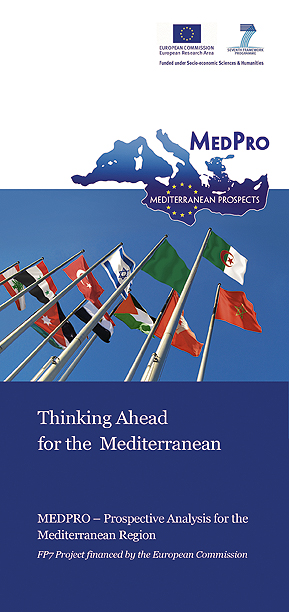- التنسيق العلمي
- الجوغرافية السياسية وحكومة
- الديموغرافيا، والصحة، والشيخوخة
- إدارة البيئة والموارد الطبيعية
- الطاقة، والتخفيف من حدة تغير المناخ
- التكامل الاقتصادي، والتجارة، والاستثمار، والتحليل القطاعي
- الخدمات المالية وسوق رأس المال
- رأس المال البشري، والحماية الاجتماعية، وعدم المساواة والهجرة
- وضع السيناريوهات وتقييم الأثر
- سيناريوهات التكامل الإقليمي والتعاون مع الاتحاد الأوروبي
Financial Development, Bank Efficiency and Economic Growth across the Mediterranean
جمعة, 08/03/2013 - 17:58 | by admin
This MEDPRO Technical Report explores the relationship between financial sector development and economic growth, using a sample of northern and southern Mediterranean countries for the years 1985-2009. The authors included several variables to measure the development of the financial sector to account both for quantity and quality effects. The results indicate that credit to the private sector and bank deposits are negatively associated with growth, which confirms deficiencies in credit allocation in the region and suggests weak financial regulation and supervision. On the stock market side, the results seem to indicate that stock market size and liquidity play a significant role in growth, especially when accounting for the quality of an institution. Investment, whether domestic or in the form of FDI, contributes significantly to economic growth. Stronger institutions and low inflation are key growth factors. Initial GDP has a persistently and significantly negative impact on growth, which implies that poorer countries are catching up richer countries in terms of economic growth.
Rym Ayadi is Senior Fellow and Head of Financial Institutions Unit at CEPS, Emrah Arbak was Researcher at CEPS, Sami Ben-Naceur is Associate Professor at the University of Tunis and Researcher at FEMISE and Willem Pieter De Groen is Researcher at CEPS.
| المرفق | الحجم | الطلبات | Last download |
|---|---|---|---|
| MEDPRO TR No 30 WP6 Ayadi.pdf | 362.57 ك.بايت | 2347 | منذ يوم واحد 13 ساعة |
تاريخ المطبوعة:
Fri, 08/03/2013








